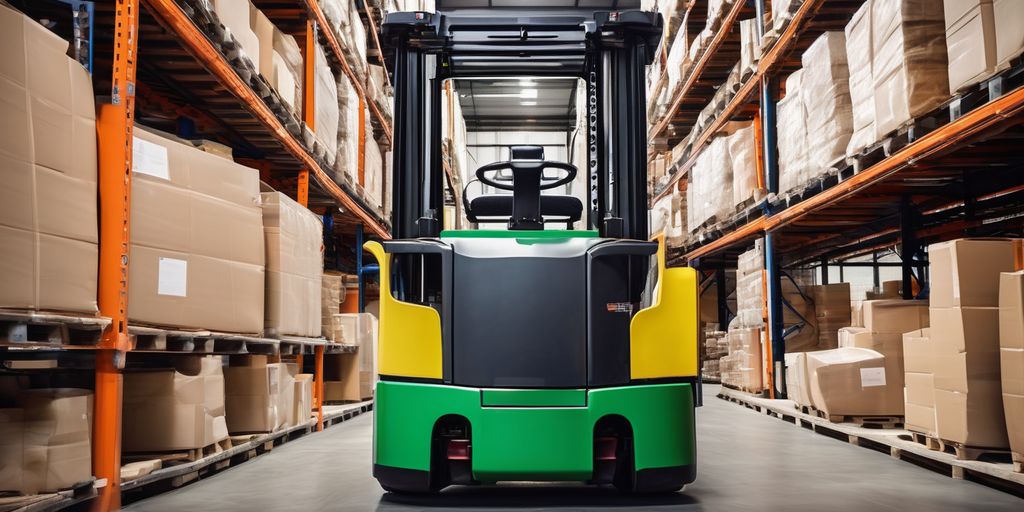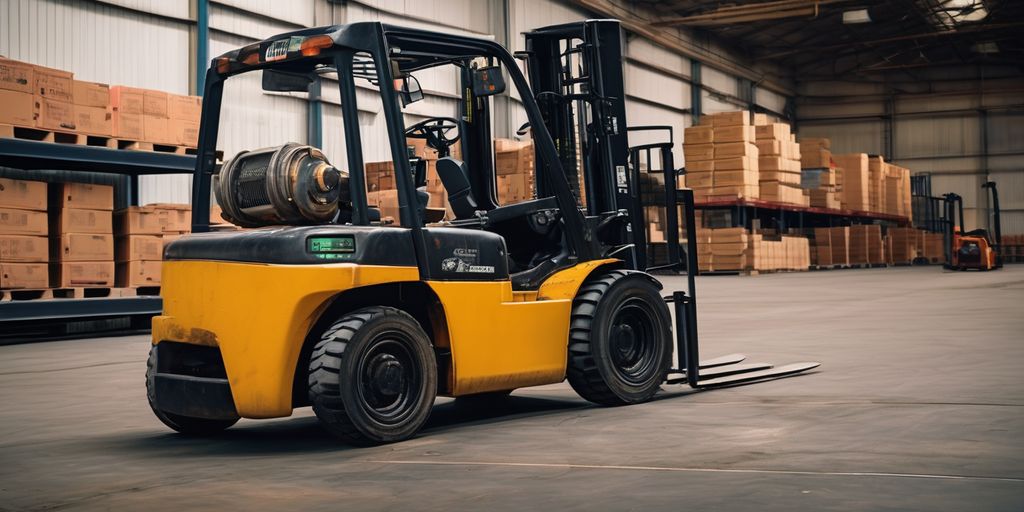The Advantages of Using Forklift Attachments in Your Operations — overview
Forklifts are essential tools in many industries, but their capabilities can be greatly enhanced with the right attachments. Forklift attachments can transform a basic forklift into a versatile machine capable of handling a variety of tasks. This article explores the many advantages of using forklift attachments in your operations, from improving efficiency to ensuring safety.
Key Takeaways
- Forklift attachments can significantly boost efficiency and productivity by allowing workers to complete tasks faster and with greater ease.
- Using the right attachments can improve safety by ensuring secure load handling and reducing the risk of workplace accidents.
- Investing in forklift attachments can be cost-effective, as they can reduce the need for multiple pieces of equipment and lower labor expenses.
- Attachments offer great versatility, enabling forklifts to handle diverse load types and adapt to various industries.
- Choosing the right forklift attachments involves considering compatibility with existing equipment, understanding specific operational needs, and ensuring proper maintenance.
Enhanced Efficiency and Productivity

Streamlined Operations with Attachments
Using forklift attachments can streamline operations significantly. Attachments like side shifters and rotators increase versatility, allowing one forklift to perform multiple tasks. This means businesses can do more with less equipment, improving overall productivity.
Reducing Downtime
Forklift attachments help in reducing downtime by allowing quick swaps between different tasks. For instance, multiple load handlers can move several loads at once, cutting down the time spent on each task. This leads to a more efficient workflow and less idle time for workers.
Multi-Tasking Capabilities
With the right attachments, forklifts can handle a variety of tasks, from lifting and rotating to shifting loads. This multi-tasking capability means that a single forklift can replace multiple specialized machines, saving on equipment costs and maximizing utility.
By utilizing the right tools, businesses can reduce labor costs, improve safety, and streamline operations.
Improved Safety Measures
Secure Load Handling
Using forklift attachments can greatly enhance the secure handling of loads. Attachments like forklift clamps ensure that materials are held firmly, reducing the risk of items falling during transport. This is especially important in busy warehouses where the risk of accidents is higher.
Minimizing Workplace Accidents
Recognizing the importance of proactive safety measures, many industries are turning to technology to mitigate the risks associated with forklift operations. Regular maintenance checks and ensuring that the forklift is in good working condition can prevent many mechanical failures that lead to accidents. Here is a list of essential safety tips:
- Always inspect the forklift and attachments before use.
- Properly secure the attachments according to the manufacturer's guidelines.
- Be mindful of the increased weight and altered balance when using attachments.
- Ensure proper training for all operators.
- Do not exceed the weight capacity limits.
- Be aware of your surroundings at all times.
Specialized Safety Attachments
There are various specialized safety attachments designed to enhance workplace safety. For example, push/pull attachments allow operators to handle loads on slip sheets rather than pallets, reducing the risk of product damage. Additionally, rotator attachments enable operators to invert or dump loads quickly, which can be crucial in emergency situations.
Discover seven innovative strategies to enhance pedestrian and forklift safety in industrial workplaces, reducing accidents and improving operational efficiency.
Cost-Effective Solutions
Reducing Equipment Costs
Using forklift attachments can significantly cut down on equipment costs. Instead of buying multiple machines for different tasks, one forklift with the right attachments can handle various jobs. This not only saves money on purchasing equipment but also reduces maintenance expenses.
Lowering Labor Expenses
Forklift attachments streamline operations, which means you need fewer workers to get the job done. This can lead to substantial savings on labor costs. By automating tasks like lifting and moving heavy loads, employees can focus on more strategic activities, enhancing overall productivity.
Maximizing Return on Investment
Investing in forklift attachments can maximize your return on investment. These attachments extend the capabilities of your existing forklifts, making them more versatile and efficient. Over time, the savings on equipment and labor costs, combined with increased productivity, result in a higher ROI.
Versatility in Material Handling

Handling Diverse Load Types
Forklift attachments are designed to handle a wide range of load types. From delicate goods to bulky items, there's an attachment for every job. For instance, fork extensions are perfect for handling longer loads, while clamps can securely manage cylindrical objects like drums and rolls.
Adaptability to Various Industries
Forklifts are versatile vehicles, but they're particularly formidable when paired with well-engineered accessories. Industries such as construction, agriculture, and warehousing benefit greatly from specialized attachments. These attachments allow forklifts to perform tasks that would otherwise require multiple pieces of equipment.
Customizable Attachment Options
One of the most significant advantages of forklift attachments is their customizability. Businesses can choose from a variety of attachments to meet their specific needs. Whether you need a rotator for frequent dumping or a push/pull attachment for handling loads without pallets, there's an option available to enhance your forklift's capabilities.
Using the right forklift attachment can turn a standard forklift into a multi-functional powerhouse, making it an essential tool in many sectors.
Types of Forklift Attachments
Forklift attachments come in various forms, each designed to enhance the functionality of your forklift. These attachments can make your forklift more versatile and efficient, allowing you to handle different types of loads and tasks with ease. Here are some of the most common types of forklift attachments:
Fork Extensions and Positioners
Fork extensions are used to extend the length of the standard forklift forks, making it easier to handle longer loads. Fork positioners, on the other hand, allow for the adjustment of fork spacing to accommodate different pallet sizes without manual adjustments. These attachments are essential for handling diverse load types efficiently.
Rotators and Clamps
Rotators are ideal for industries that require frequent dumping of loads. They allow the forks to rotate, making it easier to empty containers or reposition loads. Clamps are used to securely handle cylindrical objects like drums and rolls. These attachments are particularly useful in industries that deal with irregularly shaped loads.
Hydraulic Attachments
Hydraulic attachments enable forklifts to perform specialized tasks. For example, they can be used to lift drums or barrels, making them highly versatile. These attachments are powered by the forklift's hydraulic system, allowing for more complex operations. Hydraulic attachments can significantly enhance the capabilities of your forklift.
Considerations for Choosing Attachments

Compatibility with Existing Equipment
Before selecting a forklift attachment, it's crucial to ensure that it is compatible with your existing equipment. Not all attachments fit all forklift models, so double-check the specifications. This step helps avoid operational issues and ensures safety.
Understanding Specific Needs
Assess your specific operational needs. Consider the types of materials you will be lifting, the weight capacity required, and the layout of your workspace. Different attachments serve different purposes, so choose ones that align with your goals.
Maintenance and Upkeep
Regular maintenance is essential for the longevity and performance of forklift attachments. Establish a maintenance schedule and conduct inspections to identify any signs of wear or damage. Proper upkeep ensures that the attachments remain in optimal working condition.
Choosing the right forklift attachment can significantly impact the efficiency and safety of your material handling operations.
Conclusion
In conclusion, using forklift attachments can greatly benefit your operations. They help make your work faster and safer. With the right attachments, you can do many different tasks with just one forklift. This means you don't need to buy lots of different machines. Plus, these attachments can help keep your workers safe by making it easier to handle heavy loads. Overall, forklift attachments are a smart investment that can save you time and money while making your workplace more efficient.
Frequently Asked Questions
What are forklift attachments?
Forklift attachments are extra tools or equipment that you can add to a forklift to make it do more things. They help the forklift handle different tasks and loads, making work easier and faster.
How do forklift attachments improve safety?
Forklift attachments can help secure loads better and reduce the risk of accidents. For example, clamps can hold items tightly, and rotators can turn loads safely, reducing the chance of them falling.
Are forklift attachments cost-effective?
Yes, using forklift attachments can save money. They allow one forklift to do the job of many machines, reducing the need to buy extra equipment. This also lowers labor costs since fewer workers are needed to complete tasks.
What types of forklift attachments are available?
There are many types of forklift attachments, like fork extensions for longer loads, clamps for holding items, and rotators for turning loads. Each type helps with different tasks, making forklifts more versatile.
How do I choose the right forklift attachment?
To choose the right forklift attachment, consider what tasks you need to do and check if the attachment is compatible with your forklift. It's also important to think about maintenance and how often the attachment will be used.
Do forklift attachments require special maintenance?
Yes, forklift attachments need regular maintenance to stay in good condition. This includes checking for wear and tear, tightening bolts, and making sure all parts are working properly. Regular maintenance helps extend the life of the attachments.




Leave a comment
This site is protected by hCaptcha and the hCaptcha Privacy Policy and Terms of Service apply.